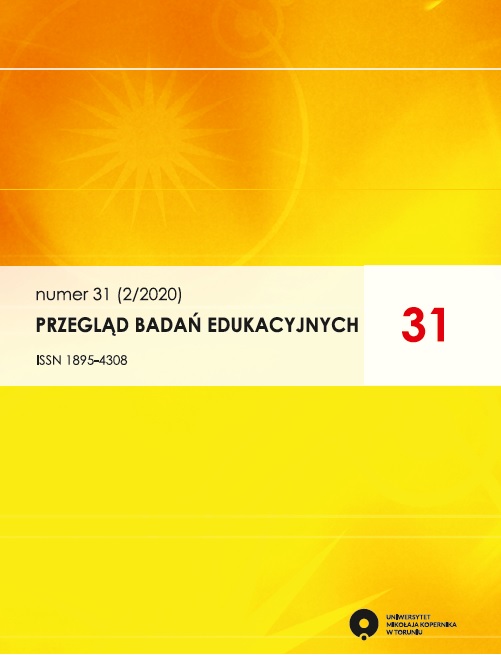Rebellion of School-Age Youth in Poland
DOI:
https://doi.org/10.12775/PBE.2020.020Keywords
contestation, youth, student strategies, rebellion, rebelliousness, R. K. MertonAbstract
In the article below I explore the level of rebellion of modern youth, in the context of various ways of adapting to school and being a student. For research purposes I use an author’s fivestage scale to measure student strategies. I developed the scale based on the model of adaptation by R. K. Merton. The study involves a group of 656 students aged 13–17 in Poland, and the analysis presented is part of a larger project on youth adaptation strategies. From all the answers provided, I select those relating to rebellion strategies. The results obtained show the average level of rebellion in the study group: means for rebellion statement range from 2.542 to 3.465 on a scale of 1 to 5. Many students feel a high level of satisfaction when they can point out mistakes to their teacher and want to speak their mind regarding school rules. However, generally this result shows that the statistical research subject has a rather neutral or positive attitude towards the goals pursued by the school. Findings indicate general approval within the tested population for entering into discussion with the teacher when the student feels the need or duty to defend his or her opinion but the mean for the statement referring to radical changes in the school indicates a relatively low need to completely change the existing school order.
References
Amai, K. (2020). Variables Affecting the School Adaptation of Secondary-School Students Who Do Not Seek Help: Attachment, Coping Style, Positivity, and
Prospects. International Journal of Adolescence and Youth, 25(1), 687–702, doi: 10.1080/02673843.2020.1717559.
Babicka-Wirkus, A. (2019). Kultury oporu w szkole. Działania – motywacja – przestrzeń [Cultures of Resistance at School. Actions – Motivation – Environment]. Warszawa: Wolters Kluwer.
Ballantine, J.H., & Spade, J.Z. (2008). Schools and Society: A Sociological Approach to Education. Los Angeles, London, New Delhi, Singapore: Pine Forge Press.
Bielska, E. (2013). Koncepcje oporu we współczesnych naukach społecznych: główne problemy, pojęcia, rozstrzygnięcia [Concepts of Resistance in Contemporary Social Studies: Main Issues, Notions and Solutions]. Katowice: Wydawnictwo Uniwersytetu Śląskiego.
Bilińska-Suchanek, E. (2003). Opór wobec szkoły. Dorastanie w perspektywie paradygmatu oporu [Resistance at Schools. Growing up in a Resistance Paradigm Perspective]. Kraków: Oficyna Wydawnicza „Impuls”.
Cybal-Michalska, A. (2006). Tożsamość młodzieży w perspektywie globalnego świata. Studium socjopedagogiczne [The Identity of Young People in a Global World Perspective. A Sociopedagogical Study]. Poznań: Wydawnictwo Naukowe UAM.
Dusza, B. (2011). Sposoby bycia licealistów w roli ucznia [The Ways of Being a High School Student]. Rzeszów: Wydawnictwo Uniwersytetu Rzeszowskiego.
Grace, M., & Seemiller, C. (2016). Generation Z Goes to College. San Francisco: Jossey- Bass A Wiley Brand.
Jackson, P. (1968). Life in Classrooms. New York: Rinehart and Winston.
Janowski, A. (1998). Uczeń w teatrze życia szkolnego [A Student in the Theatre of School Life]. Warszawa: Wydawnictwo Szkolne i Pedagogiczne.
Jaskulska, S. (2018). Rytuał przejścia: młodzież szkolna na progu edukacyjnym [A Rite of Passage: Young Students at the Educational Threshold]. Poznań: Wydawnictwo Naukowe Uniwersytetu im. Adama Mickiewicza.
Melosik, Z. (2013). Kultura popularna i tożsamość młodzieży. W niewoli władzy i wolności. [Popular Culture and Identity of the Youth. In the Bondage of Power and Freedom]. Kraków: Oficyna Wydawnicza „Impuls”.
Merton, R. K. (1968). Social Theory and Social Structure. New York, London: The Free Press; Collier Macmillan Publishers.
Mianowska, E. (2008). Strategie społecznego uczestnictwa młodzieży [Strategies of Social Participation of the Youth]. Kraków: Oficyna Wydawnicza „Impuls”.
Miller, T. (2011) The Hippies in American Values. Knoxville: The University of Tennessee Press.
Modrzewski, J. (2007) Socjalizacja i uczestnictwo społeczne. Studium socjopedagogiczne [Socialisation and Social Participation. Sociopedagogical Study]. Poznań: Wydawnictwo Naukowe UAM.
Murawska, I., & Przyborowska, B. (2017). Między konformizmem a innowacyjnością. Z badań nad strategiami uczniowskimi [Between Conformism and Innovativeness. From Studies on Students’ Strategies]. Przegląd Badań Edukacyjnych, 2(25), 247–266,
doi: 10.12775/PBE.2017.029.
Nakkula, M., & Toshalis, E. (2006). Understanding Youth: Adolescent Development for Educators. Cambridge: Harvard Education Press.
Ostrowicka, H. (2012). Urządzanie młodzieży. Studium analityczno-krytyczne [Organization of the Youth. Analytical-Critical Study]. Kraków: Oficyna Wydawnicza „Impuls”.
Schulz, R. (1992). Szkoła, Instytucja, System, Rozwój [School, Institution, System, Development]. Toruń: Wydawnictwo „Edytor”.
Woods, P. (1980). Pupil Strategies: Explorations in the Sociology of the School. London: Croom Helm.
Wysocka, E. (2012). Dzieci i młodzież w niegościnnym świecie: zagrożenia rozwojowe i społeczne [Children and Youth in a Hostile World: Developmental and Social Risks]. Warszawa: Wydawnictwo Akademickie ŻAK
Downloads
Published
How to Cite
Issue
Section
Stats
Number of views and downloads: 758
Number of citations: 0



